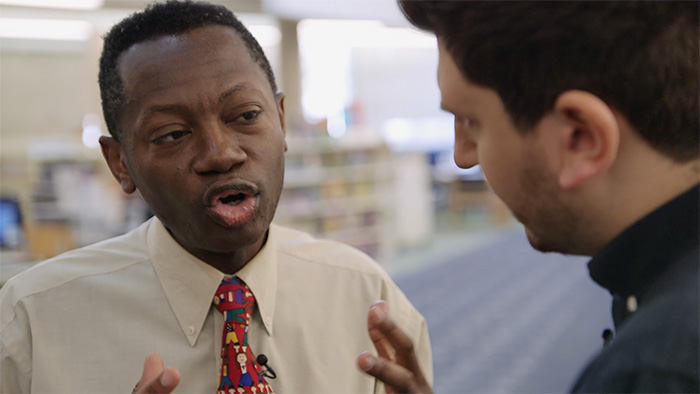2020 Honourable Mention

ONFR+, the online current affairs unit of TFO, the French-language public broadcaster in Ontario, covers francophone affairs throughout the province and produces short video documentaries on issues that impact the Franco-Ontarian community.
The ONFR+ team decided to find out how different French accents are perceived in Ontario, and what kind of impact one’s accent might have on one’s choices and opportunities. ONFR+ produced an impactful 5-part web series that revealed some of the disturbing ways in which Franco-Ontarians and other French speakers are undermined, undervalued, and put in a state of linguistic insecurity. As a result, they run the risk of being assimilated, with dire implications for the vitality of the francophone population, its institutions and its history.
Indeed, an accent can signal a lot about a person, such as where they’re from or their level of education or income. But the team found that, for Franco-Ontarians, the manner in which a person speaks French can have a particularly profound impact. It can dictate where one goes to school or whether or not one can get a job.
In one episode, we meet a young Franco-Ontarian student, Mélanie Moir, who moved from Windsor to study in French at the University of Ottawa. Once there, she discovered that her way of speaking wasn’t considered “good enough” for an academic setting, and that other students in her class didn’t want to work with her because of her accent. Some even questioned her fluency, even though French is her mother tongue. After much reflection, Mélanie moved back to Windsor to pursue her studies at the University of Windsor, in English. And her experience is not unique.

Another investigation uncovered blatantly discriminatory hiring practices that disadvantage Franco-Ontarians and other French speakers in the province. The team discovered that many recruiting companies in Ontario require that candidates, often for francophone call-centre jobs, be able to speak with a ‘Quebec French’ accent. They found former employees who admitted to being asked by their employers to ‘imitate the Quebec accent,’ and they spoke to dejected potential candidates who were excluded from applying because of the accent stipulation, many of whom were entry-level job seekers. In a diverse province like Ontario, the team showed how this policy ends up barring French-speaking candidates not only from Sudbury, Timmins, Hearst, or Orléans, but new Canadians from Africa and Haiti. Once exposed, several companies changed their hiring practices as a result of this report.
The series also sparked a wider conversation on social media about accents, discrimination, racism and human rights. And it ended on a positive note. ONFR+ highlighted mentorship programs designed to encourage and support Franco-Ontarians in their post-secondary studies, explored the up-side of the unique Franco-Ontarian culture and language with folk singer Damien Robitaille, and presented solutions from a wide variety of academic and community experts intended to empower Franco-Ontarians and give them concrete tools to protect and strengthen their linguistic and cultural heritage.
Andréanne Baribeau is a journalist and documentary producer at TFO in Toronto with a passion for creative storytelling and solutions journalism, working behind and in front of the camera to bring deep-rooted issues to light. She also worked as a reporter for Radio-Canada in Windsor and as a radio producer and show host in Kigali, Rwanda. When she’s not busy crafting new series ideas or video concepts, you can find her camping, hiking or travelling.
Joanne Belluco is a documentary filmmaker. Born and raised in France, she grew up watching Canadian films. She started her career in the film industry in Paris and has been involved in the distribution of major international award-winning feature films with Studiocanal. The heart of her work over the past fifteen years has been showcasing international artists. Her documentaries have been broadcast worldwide. She believes culture is our identity because culture constantly enriches us, questions us and is a necessity in a minority environment. She moved to Toronto in 2014 and considers herself a Canadian filmmaker.
Étienne Fortin-Gauthier reports on important social and linguistic issues at TFO. Étienne is an accomplished newsgatherer who puts the public interest first. With his in-depth stories, he aims to build bridges between people and tries to spark conversations. In the past decade, he has covered stories in Canada but also abroad in Vietnam, Kosovo and Senegal. Before joining TFO, Étienne worked for The Canadian Press and La Voix de l’Est.
Aime Majeau Beauchamp is currently in charge of podcasts at ONFR+. Prior to this, they worked at ONFR+ as an associate producer on a variety of topics related to social issues, identity, diversity, and culture. With an interest in multimedia storytelling, Aime has been doing live journalism events for the last year as videographer and stage director for the start-up Talk Media, and for the collective Stitched!. A graduate of Political Theory and Feminism at the Université du Québec à Montréal, Aime shares a lifelong passion for theatre and community engagement.
Gisèle Quenneville is the senior producer of ONFR+. She began at TFO as host of the daily current affairs show, Panorama. She then hosted and produced the weekly information magazine, 360. In 2014, she travelled throughout Canada interviewing francophone personalities from coast to coast, for Carte de visite. And in 2018, she created ONFR+, a multiplatform information hub for francophones throughout Ontario and beyond.

